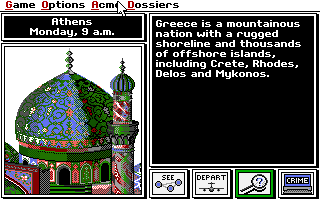tandy put their sound chip on the 1A interrupt?
-
replied to Foone🏳️⚧️ last edited by
ok I ran my dosspin tool to gibberish every byte of the save game file (it's only 102 bytes, so this is easy!) and none of them change where you start. very interesting... I'm guessing either the values are spread out too much for my gibberishing to reach, or you need to modify multiple bytes at once
-
replied to Foone🏳️⚧️ last edited by
huh, I found a hidden(?) key: if you hold down either shift, it skips all the pauses in the printing. so it goes at MAX CPU SPEED
-
replied to Foone🏳️⚧️ last edited by
ahh good. it's always fun to find code that looks like:
do{
while(variable!=0);some one has a custom tick handler that's permutating a global!
-
replied to Foone🏳️⚧️ last edited by
can't be threading, this is 16-bit DOS. There is no threading.
-
replied to Foone🏳️⚧️ last edited by
@foone enbies are allowed to commit any crimes they want, i support this /s /lh
-
replied to Foone🏳️⚧️ last edited by
@foone but there are interrupts
-
replied to nil :demisexual_flag: last edited by
@nil exactly!
-
replied to Foone🏳️⚧️ last edited by
....yeah but what if you wrote your own TSR swap engine :3
-
replied to Foone🏳️⚧️ last edited by [email protected]
looking at interrupts, and I think I found a bug.
they set handlers for various CPU errors, but they accidentally set 10 (COPROCESSOR ERROR) twice, instead of the 05 (BOUND check)/10 (COPRPOCESSOR) interrupts they savesomeone copy-pasted and missed a bit
-
replied to Foone🏳️⚧️ last edited by
I finally found the two helper functions they use to get and set vectors!
all the 30 other places I've seen them set/get vectors, they do it manually, but hey, maybe they use the helpers too
-
replied to Foone🏳️⚧️ last edited by
could also be that this is a compiler-provided bit of code, which is left in because the runtime needs it, or they just didn't eliminate dead code
-
replied to Foone🏳️⚧️ last edited by
okay I've figured out there's a shared format they're using here. it chunks the file into chunks, which have a 16-bit ID (unique per file, but not globally), an offset, and 16-bit length
-
replied to Foone🏳️⚧️ last edited by
so like, midisnd.dat will have 12 entries, and the first 11 are 200-500 bytes each, and then the last is 3k.
presumably it's each song and then some config info? -
replied to Foone🏳️⚧️ last edited by
cities.dat is very interesting. There's 30 cities in total, but 491 entries in it!
So they must be doing something odd there, that doesn't divide equally. Maybe one city-chunk gives IDs of the others?
-
replied to Foone🏳️⚧️ last edited by
idea for a test: it's easy to spot which chunk in a city is the image, because it's the biggest. Here's a way to determine if it's looking up by IDs or offsets/indices: swap the IDs of two images
-
replied to Foone🏳️⚧️ last edited by
darn. turns out you can't just renumber the chunks, because they have to be in increasing order.
so maybe I just need to leave the chunk indexes as is, and instead of moving the entries around, I move where they're pointing?
-
replied to Foone🏳️⚧️ last edited by
Bingo! I'm in Athens, but I'm seeing the image for Baghdad, and apparently with the Baghdad palette?
So one of these other chunks must be the palette for a city. Or it selects from a selection of palettes? Maybe they've just got a couple defined.

-
replied to Foone🏳️⚧️ last edited by
okay I figured out the cities.dat IDs:
They're all 1XXYY (in decimal):
XX is the city number (0-29), YY is the sub-chunk-id.So like:
YY=0: City name
YY=2: City image.They go between 00 and 22, and not all numbers need to be present.
